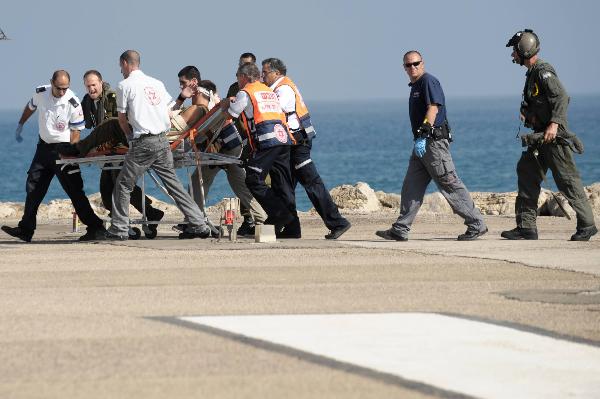Flotilla tragedy to globalize Gaza siege
 |
|
An injured person is evacuated to Rambam hospital in the northern city of Haifa, Israel, May 31, 2010. [Xinhua] |
The Israeli attack on a flotilla of aid vessels and the death of pro-Palestinian campaigners, who were en route to defy Israel's blockade on Gaza, would attract more international attention to the siege, Palestinian analysts said on Monday.
About 16 activists, most of who were Turks, were killed and dozens injured when the Israeli naval forces stormed the five ships that make Gaza Freedom Flotilla in the international waters near Israel and forced them into its ports.
The seizure of the ships, that carried 10,000 tons of aid supplies and construction materials, is qualitative operation for the international community's way of handling Gaza blockade, said Mukhaimar Abu Sa'da, political science lecturer at Gaza's Al-Azhar University.
When 750 activists from over 50 countries are attacked with gunfire in the middle of the sea for sailing to Gaza in a life- saving mission, an international awareness of the blockade would be formulated. "What happened today could be the beginning of international pressure to end the siege" on 1.5 million people in the coastal enclave, Abu Sa'da said.
Next month, the siege completes its third year with no imminent hope in the horizon to end it. Israel said the siege aims at isolating Islamic Hamas movement which took over Gaza by force in 2007 after routing troops loyal to President Mahmoud Abbas.
International organizations, including the United Nations, have often issued reports about the siege's effects on the civilian population in Gaza and were very critical about Israel's policies in defining what can be entered or banned from Gaza. Such reports encouraged Turkey, Algeria, the U.S.-based Gaza Freedom Movement and the Brussels-based European Campaign against Gaza siege to send the largest aid convoy through the sea.
"The issue of the siege was shifted into an international issue rather than just a humanitarian crisis," said Naji Shurrab, a Gaza- based analyst.
CLEANING ISRAEL'S IMAGE
The world was shocked by the way Israel has dealt with the flotilla and observers believe that the images of Israeli commandos being dropped from a helicopter on the ship's deck would contribute in more isolation and diplomatic pressure on Israel for this use of inappropriate force.
Israeli ambassadors in many European countries and in Israel's central Arab neighbors, Jordan and Egypt, were summoned as reports say Turkey was likely to withdraw its ambassador from Tel Aviv.
If reports about a severe injury or death of Sheikh Ra'ed Salah, an influential Muslim leader who is respected among Arab citizens in Israel, are proven true, Israel should prepare to face an uprising by its Arab population. "Israel might be facing an internal challenge besides its efforts to repair its reputation on the international level," Shurrab said.
Israel may allow the aid that were on the ship into Gaza, and is likely to ease the restrictions for a brief period as part of its efforts to overcome the consequences of the nautical bloodbath.
Israel's media outlets have already started reporting that those onboard the ships were extremists, terrorists and supporters of Hamas and that they attacked its forces with knives and clubs. Abu Sa'da, the academic, said Israel "is trying to tell that it has no problem delivering the aid to Gaza and the problem was those aboard."
But Shurrab noted that direct, practical actions in response to the death of the activists are unlikely to be witnessed. "Turkey itself has only withdrew its ambassador and decided to go to the Security Council. What better can the Arabs or the Palestinians do? " he wondered.
HAMAS HOLDS KEY
Hamas, which doesn't recognize Israel, could benefit from the growing international sympathy with Gaza, simply because it controls the territory. The scenes of this benefit would be more support in the Arabic and Islamic opinion and more presence on the media.
However, it is worthy to recall that Israel imposed restrictions on Gaza and developed the restrictions to a tight closure after two incidents: the capture of the Israeli soldier Gilad Shalit in 2006 and Gaza's 2007 fighting between pro-Abbas forces and Hamas.
"Israel would say that the siege will go on as long as Shalit is held hostage in Gaza," said Abu Sa'da. Shurrab sees that Hamas has also to reconcile with Abbas's Fatah party and enable his forces work in Gaza so they can take control of the crossing points between Israel and Gaza. Israel refuses to deal with Hamas on any level.
Hamas has to be flexible in negotiating swapping Shalit for a number of Palestinian prisoners and signing an Egyptian proposal for national Palestinian power-sharing pact to help lifting the siege, Abu Sa'da said.
 0
0 







Go to Forum >>0 Comments